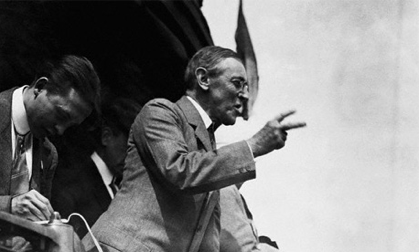|
|
Early in WWI, Wilson's position was one of neutrality. That would change. It took a courageous Woodrow Wilson to stand for a policy in the face of vitriolic opposition, or, perhaps, was it stubbornness? Wilson's dogged view for establishing a protectorate to ensure that no more wars of the magnitude of World War I would occur ended up contributing to circumstances wherein just such a protectorate was created--critically lacking the involvement of the United States--and representing the culmination of a factional political battle waged with Senator Henry Cabot Lodge of Massachusetts, whose son would later play a key role in the life of another young Massachusetts politician named John Kennedy.
Politicians used to express differences and then mend them to the point of actually governing the nation. These
days, such a knitting together of social responsibility and ideological purity seems impossible. From the days of slavery,
Henry Clay and others were able to forge agreements that have been historic in their ability to make two distinct views come
together that had previously been apart and seemingly beyond reconciliation. Lyndon Johnson was a master at the art of compromise
using his knowledge and status as a Southerner and powerful former Majority Leader to forge agreements in passing Civil Rights
legislation that his predecessor, JFK, could not get through Congress. Some politicians felt that
to compromise with Woodrow Wilson's idea of a world in which the United States would be called to war to defend a European
sovereignty was so unpalatable, that they would rather reject the association altogether. Like today, when a debt crisis seems
to have split the parties beyond repair, compromise is the key ingredient to actually governing. The world learned this painful
lesson of consequences in the absence of American involvement in the League, as Hitler re-armed and the inter-war period became
one of frightful missteps absent decisive global political leadership.
|
|||||||||||||||||||||||||


